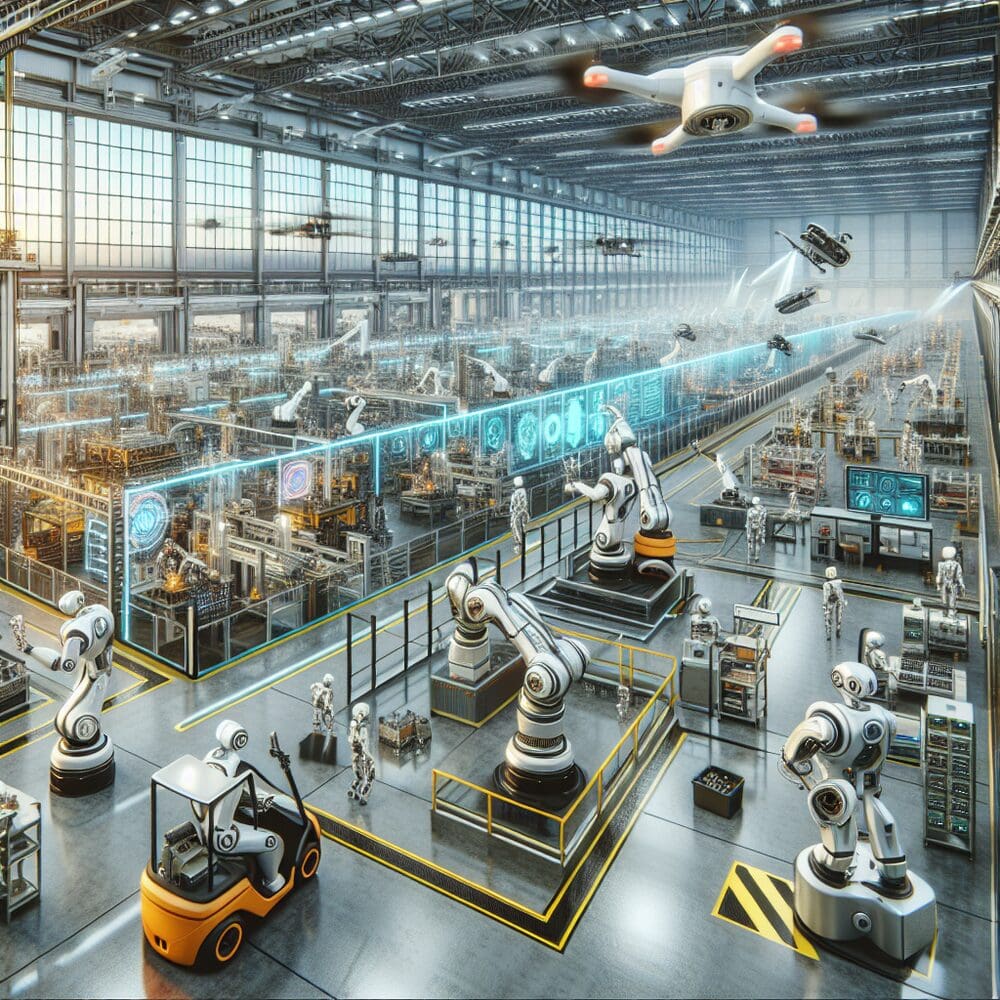The Future of Automation in Manufacturing
Image via DALL-E

As we enter an era marked by rapid technological advancements, the future of automation in manufacturing stands at the forefront of industrial evolution. This transformation is driven by integrating Artificial Intelligence, robotics, and the Internet of Things (IoT), which collectively enhance production efficiency, reduce operational costs, and improve quality control. By embracing these innovations, businesses can streamline their processes and respond more agilely to market demands and consumer preferences.
Current Trends in Manufacturing Automation
The current trends in manufacturing automation highlight a significant shift toward smart factories, where interconnected devices operate cohesively to optimize production. Technologies such as advanced robotics enable more precise and efficient assembly processes, while machine learning algorithms are employed to predict machinery failures and reduce downtime.
Moreover, implementing cloud computing facilitates real-time data analytics, allowing manufacturers to make informed decisions swiftly and improve supply chain management. As the integration of these technologies continues to evolve, manufacturers are positioning themselves to harness the full potential of automation, leading to better resource allocation and enhanced competitiveness.
Automation Innovations on the Horizon
As we look ahead, several automation innovations are poised to further reshape the manufacturing landscape. One of the most promising advancements is the emergence of collaborative robots, or cobots, designed to work alongside human operators safely and efficiently. These robots can perform repetitive tasks, allowing human workers to focus on more complex and creative responsibilities.
Additionally, the rise of augmented reality (AR) in manufacturing enhances training and operational procedures by providing real-time information overlays, facilitating quicker decision-making and reducing errors. Furthermore, the application of blockchain Technology in supply chain processes is set to improve transparency and traceability, ensuring that every component’s journey is accounted for.
How Automation Benefits Business Success
The benefits of automation in manufacturing extend beyond operational efficiency; they also play a crucial role in driving business success. By automating repetitive tasks, companies can significantly reduce labor costs and minimize human error, leading to higher-quality products and consistent output.
Furthermore, the data-driven insights gained from automated systems enable manufacturers to identify bottlenecks, optimize workflows, and proactively adjust their processes. This increased agility enhances the overall customer experience through faster, more responsive product offerings and times and fosters a culture of Innovation.
Challenges Facing Automation Standardization
Despite the numerous advantages that automation brings to manufacturing, several challenges hinder widespread standardization. One significant obstacle is the need for universally accepted standards and protocols, which complicates system integration across different platforms and technologies.
Many manufacturers may need help adopting new automation technologies due to high initial investment costs, uncertainties regarding return on investment, or the fear of job displacement among the workforce. Additionally, the rapid pace of technological change can lead to obsolescence, making it difficult for companies to keep up with the latest advancements.
Understanding the current state and future of automation in manufacturing puts your business in a more significant position to leverage these advances effectively. From maximizing power transmission efficiency to reducing or eliminating errors and downtime, this technology presents many opportunities for today’s manufacturers.
Subscribe to our newsletter and Explore insightful conversations on workplace culture, Burnout, and leadership at the Breakfast Leadership Network, ranked Top 20 globally. Join us to thrive in the modern work environment.
Please stay connected with us! For more insights and valuable content, don’t forget to check out the following resources:
– **Breakfast Leadership Show Podcast**: Tune in to our podcast and get inspired by leadership lessons and success stories from top industry leaders.
– **Breakfast Leadership YouTube Channel**: Subscribe to our YouTube channel for video content on leadership, Personal Development, and more.
– **Hire Michael D. Levitt to Speak**: Looking for a dynamic speaker for your next event? Hire Michael D. Levitt, the founder of Breakfast Leadership, to share his expertise and insights.
Follow us on LinkedIn for the latest updates. Remember to share this article with your network!
Originally Published on https://www.breakfastleadership.com/






















